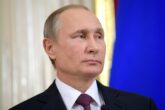November 21, 2021
Polar Bear in the Room: America Must Talk to Russia About the Arctic
As tensions between Russia and the West rise, it is imperative that they do not spill over into the Arctic. While the Arctic remained a relative oasis of cooperation for many years, there has been a recent uptick in militarization as climate change has raised the region’s perceived economic value. For the United States and European Arctic nations, Russia’s expanding military infrastructure and activity in the Arctic poses an acute security risk. To manage competition in the region, there is a need for greater military-to-military communication among all Arctic nations.
The United States and its European allies now find themselves in the dangerous position of having little opportunity to directly discuss Arctic military security with Russia, raising the chances of conflict due to miscalculation.
Russia increasingly views the Arctic as critical to both its security and prosperity. Melting sea ice has presented new economic opportunities by increasing the viability of the Northern Sea Route, yet it has simultaneously left the Russian coast more vulnerable. The region’s new priority status is reflected in the Kremlin’s recent decision to upgrade the Northern Fleet to a full-fledged military district, as well as its construction of new military bases on islands in the Arctic Ocean. Russia’s Arctic military buildup has also included the deployment of advanced radar and air defense systems throughout the region.
In addition to bolstering its military infrastructure, Moscow has stepped up the activity of its armed forces in the Arctic. Umka-21, held this past spring, was Russia’s most elaborate Arctic military exercise to date, demonstrating new capabilities such as the ability to simultaneously surface three nuclear submarines from below the ice. Additionally, in 2020 the U.S. Air Force in Alaska intercepted more Russian aircraft than at any time since the collapse of the Soviet Union. Finally, Russia has engaged in disruptive activity below the threshold of conflict, for example by jamming GPS signals during the November 2018 NATO Trident Juncture exercise.
Read the full article from The National Interest.
More from CNAS
-
Trump ‘Humiliated’ as Putin Sends Clear Message That He Doesn’t Care About US
"Putin is not playing ball." Putin's Palm Sunday attack on Sumy is "embarrassing for the White House" as it comes just days after Steve Witkoff met with the Kremlin, says adju...
By Jim Townsend
-
The Hidden Past and Uncertain Future of the U.S. and Ukraine with Celeste Wallander
Under the Trump administration, U.S. support for Ukraine is no longer guaranteed. President Trump's pause on aid and intelligence to Ukraine in March may have been brief, but ...
By Andrea Kendall-Taylor, Jim Townsend & Celeste Wallander
-
Is Russia Under Pressure?
Since 2014, the United States and its allies have provided increasing military support to Ukraine while imposing more and tougher economic sanctions on Russia, especially sinc...
By Jeffrey Edmonds
-
Europe's Trade War Woes
On April 2nd, President Trump imposed sweeping tariffs across the globe – with only a handful of countries left untouched. The EU was hit with tariffs of 20% and the European ...
By Andrea Kendall-Taylor & Jim Townsend



